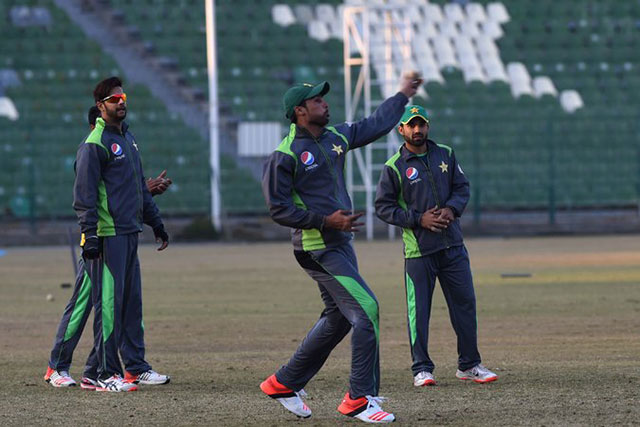
As 2015 gives way to 2016, Pakistan’s title as cricket’s storm center remains unchallenged as it continues to be afflicted by the three great scourges of modern sport — security problems, match fixing and dope. There seems little likelihood of Pakistan’s being deemed safe for international teams to visit at any time in the next year, meaning the exile of its own team to the United Arab Emirates for matches to continue.
Ban on guilty trio: Court admits plea for early hearing
But exiled as it is, Pakistan — along with its neighbor India — will be where cricket’s attention is focused for much of the coming year.
Match fixing will become a focus in January if, as seems possible, Mohammad Amir — youngest of the trio of players banned for fixing offenses in 2010 — is recalled to play in one-day internationals against New Zealand. Amir’s invitation to a fitness camp in Lahore, Pakistan, led two established team members, Azhar Ali and Mohammad Hafeez, to boycott its first two days. Azhar also offered his resignation, which was refused, as captain of Pakistan’s team for one-day internationals.
But it was doping that dealt a hammer blow Sunday, with potential consequences through 2016 and beyond. Pakistan’s star spin bowler, Yasir Shah, tested positive for the banned diuretic chlorthalidone and has been suspended while he goes through the International Cricket Council’s disciplinary procedures.
Shah, 29, has bowled so superbly in his first 12 five-day tests for Pakistan, taking 76 wickets, that he is already fourth in the world rankings. Saeed Ajmal, the world’s most dangerous spinner before his bowling action was ruled illegal, has scarcely been missed.
Were Shah to be banned, Pakistan would miss him in three major events. First would be its own domestic Pakistan Super League, a Twenty20 tournament finally — after several years of planning and delays — scheduled to take place Feb. 4-23.
While all five teams have the names of cities in Pakistan, the tournament will be played in the Emirates. But it at last gives Pakistan a stake in the developing global Twenty20 calendar, a particularly important development since its players are excluded from the lucrative Indian Premier League.
Yasir Shah suspended on doping charges
The Super League will also give Pakistan’s top players valuable practice in the shortest cricket format before this year’s global championship — the World Twenty20 — which will be played in India between March 8 and April 3. Sri Lanka, the title holder and leader in the world rankings, will most likely start as favorite, but both India, as host, and Pakistan, which has an excellent World T20 record, are serious contenders. Happiest simply to be there will be Oman, making its first appearance.
Later in the year Pakistan will be the main tourist of the summer in England, playing four tests and aiming to repair some of the damage done to its reputation on its last visit in 2010, which was marred beyond repair by the fixing scandal that earned Amir his ban.
India will be a focus for significant on-field action, not only the World T20 but the IPL, which will feature two new franchises in Pune and Rajkot. India’s greatest active cricket hero, MS Dhoni, will be the captain in Pune.
But as ever, it may be off-field events in India that resonate across the cricket world. The new president of the Board of Control for Cricket in India, Shashank Manohar, has promised a shift in India’s approach away from the single-minded pursuit of its own financial interests that has characterized its time as the cricket world’s hegemonic power. In November he criticized both the reorganization that in 2014 gave India, Australia and England control over the ICC and the accompanying financial settlement that increased its share of ICC income.
Since he also heads the ICC, some readjustment is possible. But first Manohar may have to attend to matters at home, since the Lodha report on the BCCI, ordered by India’s Supreme Court following scandals in the Premier League, will be delivered on Jan. 4.
Pakistan cricket in 2015 — hits and misses
Every year brings its comings and goings, with one big departure already promised for February when New Zealand’s captain, Brendon McCullum, retires from international cricket following its test series against Australia. McCullum’s captaincy has revitalized New Zealand’s cricket, and his batting will also be tough to replace. Kane Williamson will add captaincy at the World T20 — and possibly in other formats — to his continuing battle to be recognized as the best batsman in the world, amid fierce competition from England’s Joe Root, Australia’s captain Steve Smith and the South African AB de Villiers.
Yet the event for which 2016 truly goes down in cricket history may happen away from the glare of television cameras and international competition. Tossing for first innings dates to the 18th century but will disappear in some games in England’s venerable county championship, where the visiting captain will have the option of choosing to bowl first. A coin toss will happen only if he rejects this.
The aim is to stop a proliferation of pitches prepared to suit the home team’s bowlers and to assist spin bowlers, marginalized in recent seasons. It could be a footnote in cricket history, or a major change in playing conditions requiring all subsequent accounts to be written in terms of “before” and “after.” As ever, the fun will be in the finding out.
This article originally appeared on the New York Times, a partner of The Express Tribune.





1732351485-0/Untitled-design-(2)1732351485-0-270x192.webp)
1732351930-0/Express-Tribune-(2)1732351930-0-270x192.webp)










COMMENTS
Comments are moderated and generally will be posted if they are on-topic and not abusive.
For more information, please see our Comments FAQ